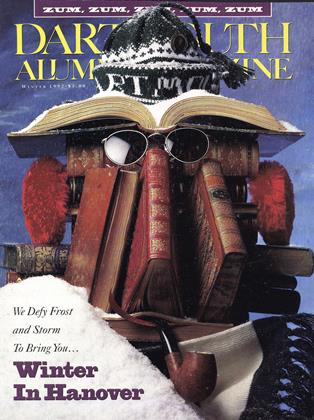We have seen the library of the future, and it includes books.
BAKER LIBRARY, Dartmouth's traditional symbol of purpose, awaits an imminent upgrade intended not only to change the way Dartmouth students learn but also to symbolize Dartmouth's intensifying academic seriousness—a computer-aided information engine designed to accelerate learning.
Baker is bulging at the seams. Traditionally, libraries are considered full when they hit 80 percent capacity (that extra 20 percent is needed in order to be able to put things back on the shelves), and Dartmouth has been "full" for a couple years now. Already, many books and periodicals are stored in an off-campus warehouse, and while the College plans on turning Webster Hall into a special-collections repository, the library needs still more new space.
Blueprints drawn up by the administration have led planners into unexpected realms of inquiry Bruce Pipes, head of Dartmouth's planning efforts, found himself mediating between two groups on campus, trying to pull together a workable library-expansion plan that will satisfy both the traditional library-card-carrying professors and students who enjoy exploring the stacks, as well as the portable-computer-armed scholars who would much rather use today s technology to grind through volumes of information in a matter of seconds. Now, with an opportunity actually to expand the library plant, techies involved with the planning don't want to miss out on this rare opportunity. Ten years ago John Kemeny predicted that by now we'd be hearing the death knell of paper-based books as computer screens replaced the printed word. "He said that we'd be seeing big changes now, but obviously he was wrong," said Pipes. "But I think he was wrong only in his time frame. He did not take into account the library culture."
"I call it the wishful thinking syndrome," said College Librarian Margaret Otto. "The expansion is not going to save money. There will still be needs to build in the future and that, too, will be expensive."
 View Full Issue
View Full Issue
More From This Issue
-
 Feature
FeatureKnow Your Place
December 1992 By George J.Demko -
 Feature
FeatureCure1 For The Common Cold2 Proven3 At Dartmouth4!
December 1992 By TIG TILLINGHAST '93 -
 Cover Story
Cover StoryThe Library Culture
December 1992 -
 Cover Story
Cover StoryThe Ether Library
December 1992 -
 Cover Story
Cover StoryWith Hard-bound Books, Who Needs Digital?
December 1992 -
 Cover Story
Cover StoryTechnology Now and in the Future
December 1992
Tig Tillinghast '93
-
 Article
ArticleThe Second Four Years
September 1992 By Tig Tillinghast '93 -
 Article
ArticleOne Good Pull
September 1992 By Tig Tillinghast '93 -
 Article
ArticleA Leader of Gay Journalists
October 1992 By Tig Tillinghast '93 -
 Article
ArticleThe Anti-Doctor Doctor
December 1992 By Tig Tillinghast '93 -
 Feature
FeatureCure1 For The Common Cold2 Proven3 At Dartmouth4!
December 1992 By TIG TILLINGHAST '93 -
 Feature
FeatureTwo Women, Once Alive
October 1993 By Tig Tillinghast '93








